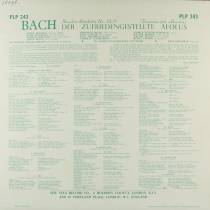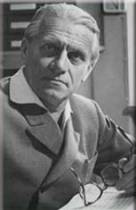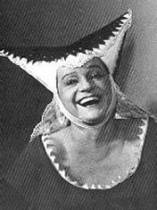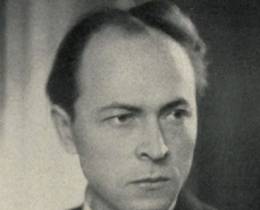

Hans Grischkat
Born: August 29, 1903 - Hamburg, Germany
Died: January 10, 1977 - Stuttgart, Germany
The German conductor and pedagogue, Hans (Adolf Karl Willy) Grischkat [or Grishkat], studied at the University of Tübingen and at the Hochschule für Musik in Stuttgart.
In 1924 Hans Grischkat organized the Reutlingen Chorale. In 1931 he formed the Swabian Chorale, and in 1936 the Grischkat Chorale in Stuttgart. He gained a fine reputation as a choral conductor in Germany. From 1945 to 1950 he led the Swabian Symphony Orchestra in Reutlingen. In 1946 he was appointed instructor of Choral conducting in the Hochschule für Musik in Stuttgart. From 1968 until his death he led the orchestra, conducting classes there.
Käthe Netwig
Born: 1916 - Kreuzburg, Silesia, Germany
The German soprano, Käthe Nentwig, completed her singing studies in Breslau and Vienna.
In 1939 Käthe Nentwig made her debut at the Stadttheater of Stadttheater von Plauen as Queen of the Night. She remained in Plauen until 1940. Engagements at the Stadttheater of Wilhelmshaven (1940-1941) and the Nationaltheater of Weimar (1941-1943) followed. In 1943 she was appointed to the Staatsoper of Munich. Here she sang Pagen Oscar in »Maskenball« by Verdi and Blondchen in »Entführung aus dem Serail«; then the picks of her coloratura repertoire were as Zerbinetta in Ariadne auf Naxos, the Queen of the Night in Zauberflöte, Gilda in Rigoletto, Despina in Così fan tutte, Sophie in Rosenkavalier and Susanna in Le Nozze di Figaro. In 1943 she sang at the Salzburg Festival a small role in Zauberflöte, and in 1953 the soprano solo in the Mozart Requiem. In 1953 she appeared at the Covent Garden Opera in London as Xanthe in Die Liebe der Danaë by R. Strauss. She remained until 1957 in engagement at the Staatsoper of Munich, and since then appeared as a constant guest at the Opera House of Cologne, where she appeared also under the name Käthe Schmitt-Nentwig.

Ruth Michaelis
Born: 1909 - Germany
The German contralto, Ruth Michaelis, was trained by Hans Beltz and Jeanne Robert in Berlin, as well as by Anna Bahr Mildenburg in Munich.
Ruth Michaelis made her debut in 1932 at the Stadttheater of Halberstadt, to which she belonged until 1935. She sang then at the Stadttheater of Cottbus (1935-1937), at the Staatsoper of Stuttgart (1937-1938) and at Stadttheater of Augsburg (1938-1939). In 1937 she appeared in Stuttgart in the premiere of the operetta Monika by Nico Dostal. In 1939 she came it to the Münchner Staatsoper. Here she had a very successful career for more than twenty years until 1961. In 1942 she appeared at the Salzburg Festival. Here she sang Kartenaufschlägerin in Arabella (1942-1943), Marcellina in Le Nozze di Figaro (1946-1947), and soloist in the Mozart Requiem (1946) and in the Coronation Mass. She also appeared in Bordeaux, Lisbon, Barcelona, Rome and London.
Ruth Michaelis’ big stage roles were: Dorabella in Così fan tutte, Marthe in Faust by Charles Gounod, Suzuki in Madame Butterfly, Floßhilde in Nibelungenring and Hänsel in Hänsel und Gretel by Engelbert Humperdinck.
After conclusion of her singing career, Ruth Michaelis worked as a teacher in Munich, since 1956 Professor at the National Opera School of Istanbul. In 1968 she taught singing at the University of Florida. Finally she was employed as a teacher in Santa Barbara, California. In the USA she was also active as outstanding opera director on the stage as in the concert hall. She was highly estimated singer, particularly as Bach interpreter.

Franz Kelch
Born: November 1, 1915 - Bayreuth, Germany
The German bass-baritone, Franz Kelch, was allowed to visit, at the age of 10, a Parsifal performance at the Festspielhaus in Bayreuth. Later, and still a young person, he sang in 1933-1934 with the Meistersinger performances in the choir at the background. From that place he heard the most famous singers of the time, from there came the first impulse to become a singer. As he grew up, he received at school instrumental music training on the violin. An immediate singing study was not to be thought of. Only after 2 years of mandatory military service he could begin his singing training with Henriette Klink in Nürnberg, parallel to the military service and financed with the help of the Schmalen Soldes.
The outbreak of the World War II interrupted the training so hopefully begun and destroyed all prospects and plans for many years. During the war Franz Kelch was arrested for two years in prisoner-of-war camp. He worked purposefully also there on the perfection of his voice and gave Lieder recitals with fastidious programmes before the along caught prisoners-of-war.
After the home coming, in desolate time, it was a venture for Franz Kelch to hold to the occupational aspiration as free-lance Lieder and oratorio singer. Since he had married had to take care for his family with two children during the war, he had to teach immediately. Among other things he was responsible for vocal training at a seminar for priests in Freising and at the Jesuitenkolleg in Pullach. The Bayerische Rundfunk (Bavarian broadcast) used him frequently with programmes of early music and with new works of Munich composers (Haas – Zilcher – Rossmann – Suder – Jacobi – Kammeier – Altmann).
Already in 1948 Franz Kelch appeared with the Münchner Philharmoniker under Rudolf Lamy in the Deutsche Requiem by J. Brahms; a little later in the Mass in B minor (BWV 232) of J. S. Bach under Michael Schneider with the Heinrich-Schütz-Kreis and with the Bamberger Symphoniker in the 9th Symphony of Beethoven unter Josef Keilberth. In 1951 he came with the young Karl Richter to Munich. Immediately a fruitful co-operation resulted in the following years, whereby Kelch sang the bass parts of all big Bach works and numerous cantatas. The Thomaskantor Günther Ramin got him for his two tours of Western Europe and for the Archiv Produktion recording of the Johannes-Passion (BWV 245) in Leipzig. After short time Franz Kelch, with the wide bass-baritone voice, expanded his repertoire to include works from Monteverdi to the modern times. He always experienced special appreciation in the role of Christ in the Bach Passions.
Cantata BWV 205
Zerreißet, zersprenget, zertrümmert die Gruft
Der zufriedengestellte Aeolus
Soprano [Pallas]: Käthe Netwig Contralto [Pomona]: Ruth Michaelis Tenor [Zephyrus]: Werner Hohmann Bass [Äolus]: Franz Kelch
Schwäbischer Singkreis Stuttgart Ton-Studio Orchestra Stuttgart
Conductor: Hans Grischkat
Rec.: 1952 Текст кантаты тут: http://www.cs.ualberta.ca/~wfb/cantatas/205.html
| 
